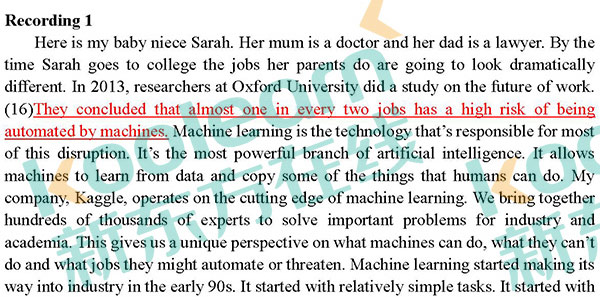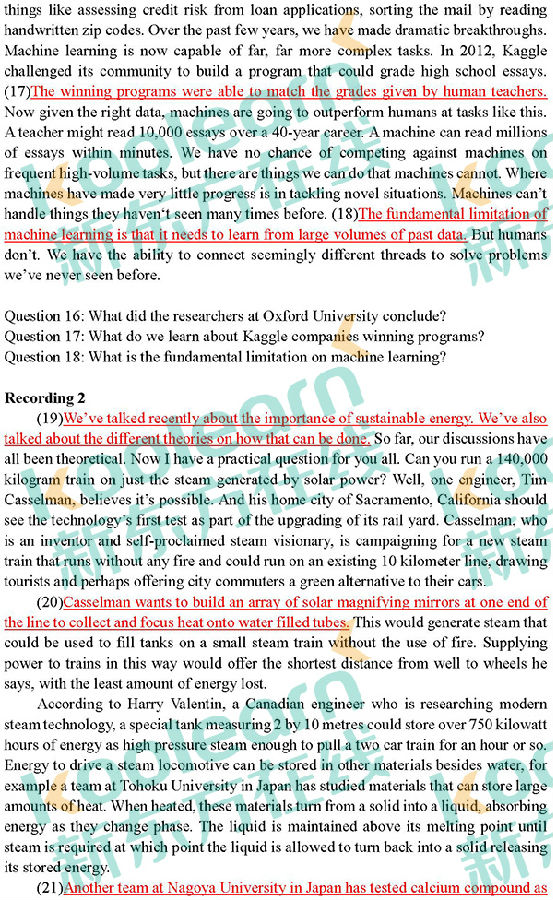六级课程经典
零基础速升HOT
去试听
六级1对1
定制化
寒假跟学攻略
0元
六级核心词带背
9.9
六级阅读 冲刺200+大招
0元
六级真题+答案
免费
听力提升 VOA&BBC原声
热门
132个保研故事免费
考研真题大全
免费
考研特训营
免费
27考研书单
推荐版
考研AI择校
智能
新东方在线英语六级频道考后发布2018年12月六级听力真题及答案卷一-讲座/讲话(新东方在线),同时新东方实力师资团队将对英语六级真题答案做权威解析,免费领取【大学英语六级真题解析】课程。更多2018年12月英语六级听力真题答案、英语六级作文真题范文、英语六级阅读真题答案、英语六级翻译真题答案,请查看【2018年12月英语六级真题答案解析】专题。预祝大家高分通过大学英语六级考试!
2018年12月英语六级真题及答案大汇总 | ||
题型 | ||




六级听力讲座1、2 原文及解析
新东方在线
Recording One
Today I'm going to talk about a very special kind of person. Psychologists call them masters of deception. Those rare individuals with a natural ability to tell with complete confidence, when someone is telling a lie. (16) For decades, researchers and law enforcement agencies have tried to build a machine that will do the same thing. Now, a company in Massachusetts says that by using magnetic brain scans, they can determine with 97% accuracy whether someone is telling the truth.
They hope that the technology will be cleared for use in American courts by early next year. (17)But is this really the ultimate tool for you? The lawyers of tomorrow? You will not find many brain scientists celebrating this breakthrough. The company might be very optimistic, but the ability of their machine to detect deception has not provided credible proof. That's because the technology has not been properly tested in real world situations. In life, there are different kinds of lies and diverse contexts in which they're told. These differences may elicit different brain responses.
Does their hypothesis behind the test apply in every case? We don't know the answer, because studies done on how reliable this machine is have not yet been duplicated. Much more research is badly needed. Whether the technology is eventually deemed reliable enough for the courts will ultimately be decided by the judges. Let's hope they're wise enough not to be fooled by a machine that claims to determine truthfulness at the flip of a switch. They should also be skeptical of the growing tendency to try to reduce all human traits and actions to the level of brain activity. Often, they do not map that easily.
Moreover, understanding the brain is not the same as understanding the mind. Some researchers have suggested that thoughts cannot properly be seen as purely internal. Instead, thoughts make sense only in reference to the individuals external world. So while there may be insights to be gained from matching behavior to brain activity, those insights will not necessarily lead to justice in a court of law. Problems surround the use of machines to spot deception, at least until it has been rigorously tested. (18)A high tech test that can tell when a person is not telling the truth. Sounds too good to be true. And when something sounds too good to be true, it usually is.
Question 16. What have researchers and law enforcement agencies tried to do?
Questions17. How do many brain scientists respond to the Massachusetts companies so called technological breakthrough?
Question 18. What does the speaker think of using a high tech test to determine whether a person is telling the truth?
讲座1解析
如同上课时我们讲到的,讲座题一定要听好开头,开头往往揭示主题。本篇开头即提到一类人,masters of deception。对于生僻名词必然给出解释: Those rare individuals with a natural ability to tell with complete confidence, when someone is telling a lie.
当我们听到But is this really the ultimate tool for you? The lawyers of tomorrow? You will not find many brain scientists celebrating this breakthrough. 时,我们得知很多科学家持反对意见。
我们在设问后的问题之处得知but之后便是17题的答案,has not provided credible proof.
本篇难点在于16,17题离得比较近,符合我们所讲的连续出题原则,考生须在确定一题答案后马上开始对下一题的判断。后面大段不出题,知道最后给出最后一题的答案。
18题作者对于使用高科技仪器测谎的想法是too good to be true,所以需要选择和负面色彩相关的选项。
Recording Two
Last week, I attended a research workshop on an island in the South Pacific. Thirty people were present, and all except me came from the island called Mcclure in the nation of Vanuatu. They live in sixteen different communities and speak sixteen distinct languages. In many cases, you could stand at the edge of one village and see the outskirts of the next community. (19)Yet the residents of each village speak a completely different language. According to recent work by my colleagues at the Max Plank Institute for the science of human history, this island, just one hundred kilometers long and twenty kilometers wide, is home to speakers of perhaps forty different indigenous languages. (20)Why so many? We could ask the same question of the entire globe. People don't speak one universal language or even a handful. Instead, today, our species collectively speaks over seven thousand distinct languages, and these languages are not spread randomly across the planet. For example, far more languages are found in tropical regions that in the milestones. the tropical island of new guinea is home to over nine hundred languages, Russia, twenty times larger, has 105 indigenous languages.
Even within the tropics, language diversity varies widely. For example, the two hundred and fifty thousand people who live on Vanuatu’s eighty islands speak 110 different languages. But in Bangladesh, a population six hundred times greater speaks only 41 languages. How come humans speak so many languages? And why are they so unevenly spread across the planet? As it turns out, we have few clear answers to these fundamental questions about how humanity communicates. Most people can easily brainstorm possible answers to these intriguing questions. They hypothesized that language diversity must be about history, cultural differences, mountains or oceans dividing populations.
But when our diverse team of researchers from six different disciplines and eight different countries began to review what was known, we were shocked that only a dozen previous studies had been done, including one we ourselves completed on language diversity in the Pacific. These prior efforts all examine the degree to which different environmental, social, and geographic variables correlated with a number of languages found in a given location. The results varied a lot from one study to another, and no clear patterns emerged. The studies also ran up against many methodological challenges, the biggest of which centered on the old statistical saying, “Correlation does not equal causation”.
Question19. What does the speaker say about the island of Mcclure?
Question 20. What do we learn from the talk about languages in the world?
(缺21题)
讲座2解析
本篇听好开头an island in the South Pacific,即知道内容说的和岛屿相关,当听到the island called Mcclure in the nation of Vanuatu,便需认真听后面的内容,They live in sixteen different communities and speak sixteen distinct languages. 知道本文确切内容为语言。
19题为转折后出题:the residents of each village speak a completely different language。
20题符合问句后出题。答案为转折处instead之后的内容: today, our species collectively speaks over seven thousand distinct languages, and these languages are not spread randomly across the planet.
更多内容请查看【2018年12月英语六级真题答案解析】专题
2019年6月英语六级新考季课程限时88折
活动时间:12月15日-12月17日
扫码关注新东方在线服务号
新东方英语六级好课免费听↓↓↓
| 课程名称 | 课程亮点 | 试听 |
| 【小班课】英语四六级零基础无忧计划 | 1V1答疑 | 免费试听 |
| 【零基础】四六级全科专项突破 | 单项全面进阶 | 免费试听 |
| 【阅读】四六级阅读高分技巧 | 双师精讲阅读 | 免费试听 |
| 【写作】四六级写作万能模板 | 双师精讲写作 | 免费试听 |
| 【听力】四六级听力高分技巧 | 双师精讲听力 | 免费试听 |
| 【寒假班】英语四六级全程班 | 考前冲分快准狠 | 免费试听 |
| 了解更多四六级课程 | ||
本文关键字:

 资料下载
资料下载
2022年大选英语四级词汇完整带音标
发布时间:2020-04-15关注四六级小助手服务号
回复【过级词汇】获取
刘一男六级核心词汇完整版
发布时间:2020-04-15关注四六级小助手服务号
回复【过级词汇】获取
新东方英语口语终极教程word版
发布时间:2020-04-15关注四六级小助手服务号
回复【口语提升】获取
大学英语六级:练口语及单词lesson1-9
发布时间:2020-04-15关注四六级小助手服务号
回复【口语提升】获取
新东方在线[四六级王牌团队]典藏笔记
发布时间:2019-10-25关注四六级小助手服务号
回复【典藏笔记】获取
英语六级过级备考资料:经验+计划+语法
发布时间:2019-10-25关注四六级小助手服务号
回复【过级经验】获取
大学英语六级阅读解题经验技巧
发布时间:2019-10-25关注四六级小助手服务号
回复【阅读礼包】获取
英语四级写作诵读193经典句
发布时间:2019-10-25关注四六级小助手服务号
回复【写作指导】获取
英语六级听力讲义汇总资料
发布时间:2019-10-25关注四六级小助手服务号
回复【听力礼包】获取
英语六级口语考试练习小积累
发布时间:2019-10-25关注四六级小助手服务号
回复【口语提升】获取
大学英语六级核心高频词汇
发布时间:2019-10-25关注四六级小助手服务号
回复【过级词汇】获取

关注四六级小助手服务号回复【典藏笔记】获取
关注四六级小助手服务号,
获取学习资料

 推荐阅读
推荐阅读
2023年12月英语六级真题及答案(第三套)包括听力和笔试部分,笔试部分为图片版,支持免费下载。
来源 : 新东方在线 2024-02-29 10:07:59 关键字 : 2023年12月六级真题
2023年12月英语六级真题及答案(第二套)包括听力和笔试部分,笔试部分为图片版,支持免费下载。
来源 : 新东方在线 2024-02-29 10:07:04 关键字 : 2023年12月六级真题
2023年12月英语六级真题及答案(第一套)包括听力和笔试部分,笔试部分为图片版,支持免费下载。
来源 : 新东方在线 2024-02-29 10:00:32 关键字 : 2023年12月六级真题
2023年12月英语六级考试已经在12月16日下午结束了,相信同学们想对下六级答案,估算下自己的六级成绩。新东方六级老师已经第一时间整理
来源 : 新东方在线 2023-12-16 17:14:09 关键字 : 六级听力答案,六级听力真题
2023年12月英语六级考试已经在12月16日下午结束了,相信同学们想对下六级答案,估算下自己的六级成绩。新东方六级老师已经第
来源 : 新东方在线 2023-12-16 17:26:00 关键字 : 六级听力原文,六级听力答案


 专项提升公开课
专项提升公开课
专为基础薄弱打造 重磅升级
价格 : ¥279
限报人数:1000人
1v1小灶课
价格 : ¥1799
限报人数:1000人
报名必得3大词汇资料包
价格 : ¥0
限报人数:10000人
随领随学 告别‘小聋瞎’
价格 : ¥0
限报人数:1000人
 资料下载
资料下载
关注四六级小助手服务号
回复【过级词汇】获取
关注四六级小助手服务号
回复【过级词汇】获取
关注四六级小助手服务号
回复【口语提升】获取
关注四六级小助手服务号
回复【口语提升】获取
关注四六级小助手服务号
回复【典藏笔记】获取
关注四六级小助手服务号
回复【过级经验】获取
关注四六级小助手服务号
回复【阅读礼包】获取
关注四六级小助手服务号
回复【写作指导】获取
关注四六级小助手服务号
回复【听力礼包】获取
关注四六级小助手服务号
回复【口语提升】获取
关注四六级小助手服务号
回复【过级词汇】获取

 阅读排行榜
阅读排行榜
 相关内容
相关内容